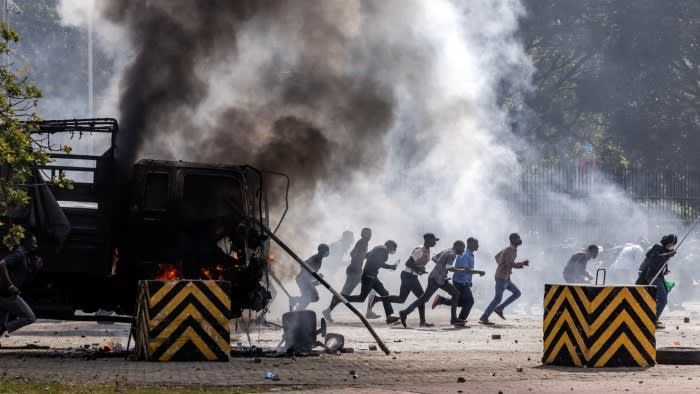Kenya’s Ruto warns of ‘attack on democracy’ after protesters storm parliament

Access the Editor's Digest at no cost
Roula Khalaf, the person in charge of the FT, picks out the stories she likes the most for this newsletter that comes out every week.

Kenya's President William Ruto stated that his country faced an unexpected assault on its democracy when protesters invaded parliament on Tuesday to oppose proposed tax increases.
Law enforcement officers deployed tear gas and firearms against demonstrators who were gathered outside the structure. The use of live ammunition resulted in the deaths of a minimum of five individuals and left over 30 others wounded, as reported by organizations advocating for human rights.
Later that day, the army was sent out after sections of the parliament building in Nairobi were set ablaze and the lawmakers ran away.
"In a speech that was broadcasted on television, Ruto stated that a group of criminals took over and disrupted a peaceful demonstration organized by law-abiding citizens in Kenya to express their basic rights and freedoms of assembly, protest, and petitioning of public authorities."
"I promise the nation that the government has used all available resources to make sure that an incident like this will not happen again," he stated.
On Tuesday, the government approved a bill to raise taxes, such as fuel and import duties, even though there were protests against it. The legislation is now waiting for Ruto's approval.
Protesters are demanding an economic shutdown in response to Ruto's proposed $2 billion tax increase, which is intended to address the financial struggles of the heavily indebted country.
The leader aims to decrease the budget shortfall from 5.7% of the country's economic output this year to 3.3% next year. This is an effort to strengthen Kenya's financial situation, partially to meet the requirements of an IMF program.
The demonstrators are saying that the policies will make it more difficult for a lot of Kenya's 54 million residents to survive financially.
Many unemployed young Kenyans, who identify as Generation Z, have taken the lead in protesting against the law in the last week.
"Ruto plans to put a lot of taxes on Kenyans through the finance bill," stated Davis Tafari, a 25-year-old leader of the protests in Nairobi. Describing the bill as harsh and oppressive, he said, "We will keep protesting until Ruto is no longer in power."

In his speech, the president expressed his gratitude to the youth of Kenya for their contribution to organizing our country's democratic conversations.
He also stated that discussions in our country should always uphold and honor the important principles that our nation was built upon, including following the Constitution, upholding the rule of law, and respecting our institutions.
Earlier, the police attempted to break up the group of mostly youthful demonstrators who were shouting "Ruto needs to leave!"
An alliance of legal, medical, and human rights groups, including Amnesty International's Kenya division, have verified that a minimum of five people were killed and over 30 were hurt. Among those injured, 13 were struck by live ammunition.
Representatives from several countries, such as the United States, a strong supporter of Ruto, expressed their worry about the violent events that occurred in various areas of the country during the recent demonstrations. They also expressed sadness about the unfortunate deaths and injuries that occurred, some of which were caused by the use of real bullets.
Independent organizations reported on Tuesday that over 50 individuals were taken into custody within the last day, along with 21 cases of "abductions and disappearances involving both uniformed and plainclothes officials."
The top judge, Martha Koome, expressed her strong worries about the reports of kidnappings, a worry that was also mentioned by the United States and other nations.
Last week, when the protests started, politicians in the governing coalition removed some of the most contentious ideas from the bill, like increasing taxes on bread, oils, diapers, mobile payments, and cars. Members of the opposition party declined to participate in the vote on the bill.
Opposition legislator Otiende Amollo stated on Tuesday that a bad bill cannot be fixed. He emphasized the importance of completely withdrawing the finance bill.
The increase in taxes is expected to generate an extra $2.3 billion in revenue for the upcoming fiscal year. Njuguna Ndung'u, the Treasury secretary of Kenya, has cautioned that if the tax hikes are not approved, it could lead to a shortfall of $1.5 billion in the budget. This could then result in cuts to spending, potentially affecting services like school meal programs.
James Shikwati, an economist from Nairobi, mentioned that President Ruto and his group are not interested in cutting expenses, but in increasing taxes to meet the IMF requirements. He also stated that if President Ruto pushes for the bill, he believes that protests will persist.
In 2022, Ruto became the leader of the country with a promise to help reduce the financial strain on the people of Kenya. However, he has been met with widespread demonstrations following his decision to eliminate fuel subsidies and impose additional taxes.
The World Bank has reported that almost 38 percent of Kenya's revenue is being used to pay off interest on its debt. The IMF has also warned that Kenya's debt, which is more than 68 percent of its GDP, is at a high risk of becoming unsustainable.
"I'm standing up against the finance bill because it will harm the everyday citizen," stated Malaika Agunda, a 21-year-old nursing student who works hard to make ends meet while studying on campus. "We need to say no to this bill! It's time to take a stand!"





















































